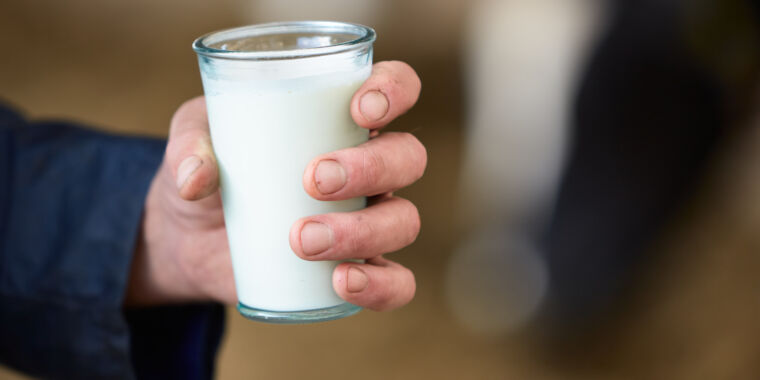The Dangers of Drinking Raw Milk During the H5N1 Bird Flu Outbreak
To consume raw milk at any point is to take risks with harmful microbes. However, with the unprecedented spread of H5N1 avian flu in US dairy cows, the dangers have increased significantly. Health professionals are now urging the public against drinking raw milk while this outbreak continues, the full extent of which is still unclear.
The Response of Raw Milk Enthusiasts
In spite of the escalated risk, fervent raw milk supporters remain undeterred. The Raw Milk Institute based in California has dismissed the warnings as “clearly fearmongering.” Mark McAfee, the founder of the institute, mentioned to the Los Angeles Times that a specific request for raw milk from H5N1-infected cows is coming from his clientele. This request stems from the unfounded belief amongst these consumers that consuming high quantities of the avian influenza virus will grant them immunity.
Michael Payne, a seasoned expert, labeled this approach as “playing Russian roulette with your health.” As a researcher and dairy outreach coordinator at the Western Institute for Food Safety and Security at UC Davis, Payne emphasized that intentionally trying to infect oneself with a known pathogen defies all medical wisdom and common sense.
Emerging Insights on Avian Influenza in Cattle
Prior to March 25, the presence of the H5N1 virus within dairy herds in the US was unheard of. However, the US Department of Agriculture’s confirmation of the virus within a Texas dairy herd marked a turning point. Since then, reports have surfaced of 42 herds in nine states affected by the virus. Initial findings indicate direct cow-to-cow transmission post a single spillover event, with the 42 herds linked through cattle movement between farms.
- Risks to Cows:
- Primary Targets: Mammary Glands
- Data from a recent preprint suggests that cows’ udders are rich in the molecular receptors required for bird flu virus attachment, potentially facilitating the emergence of new viral variants.
Risks Present in Raw Milk
Findings suggest that raw milk contains elevated levels of H5N1 viral particles, with the potential to transmit the virus to mammals. A recent study detailed how a group of farm cats suffered severe illness after consuming milk from H5N1-infected cows, with some displaying fatal neurological symptoms.
There is a stark contrast between cows and cats in terms of flu receptor distribution. While cows exhibit receptors primarily in their mammary glands, cats display widespread receptor presence across various organs, leading to more severe infections.
Historical Context of Raw Milk Consumption
Before pasteurization became standard practice, raw milk was a prevalent source of infections, contributing significantly to foodborne disease outbreaks. The FDA reported that milkborne outbreaks accounted for 25 percent of all foodborne illnesses in 1938. Over recent years, raw milk has been implicated in less than 1 percent of such outbreaks, affirming the importance of pasteurization.
The CDC highlighted that regions where raw milk sales were legal had 3.2 times more outbreaks from 1998 to 2018 compared to regions where raw milk sales were prohibited. The risks associated with raw milk consumption are evident.
Global Insights and Recommendations
The World Health Organization has reported 888 cases of H5N1 in humans globally, with a fatality rate of 52 percent. While the transmission of H5N1 through raw milk remains unproven, the FDA advises against the consumption of raw milk from infected cattle during such outbreaks.
In conclusion, the latest outbreak of H5N1 in US dairy cows serves as a stark reminder of the health risks posed by consuming raw milk during public health crises. It underlines the critical need for caution and adherence to health guidelines to safeguard against potential infections.
Image/Photo credit: source url





